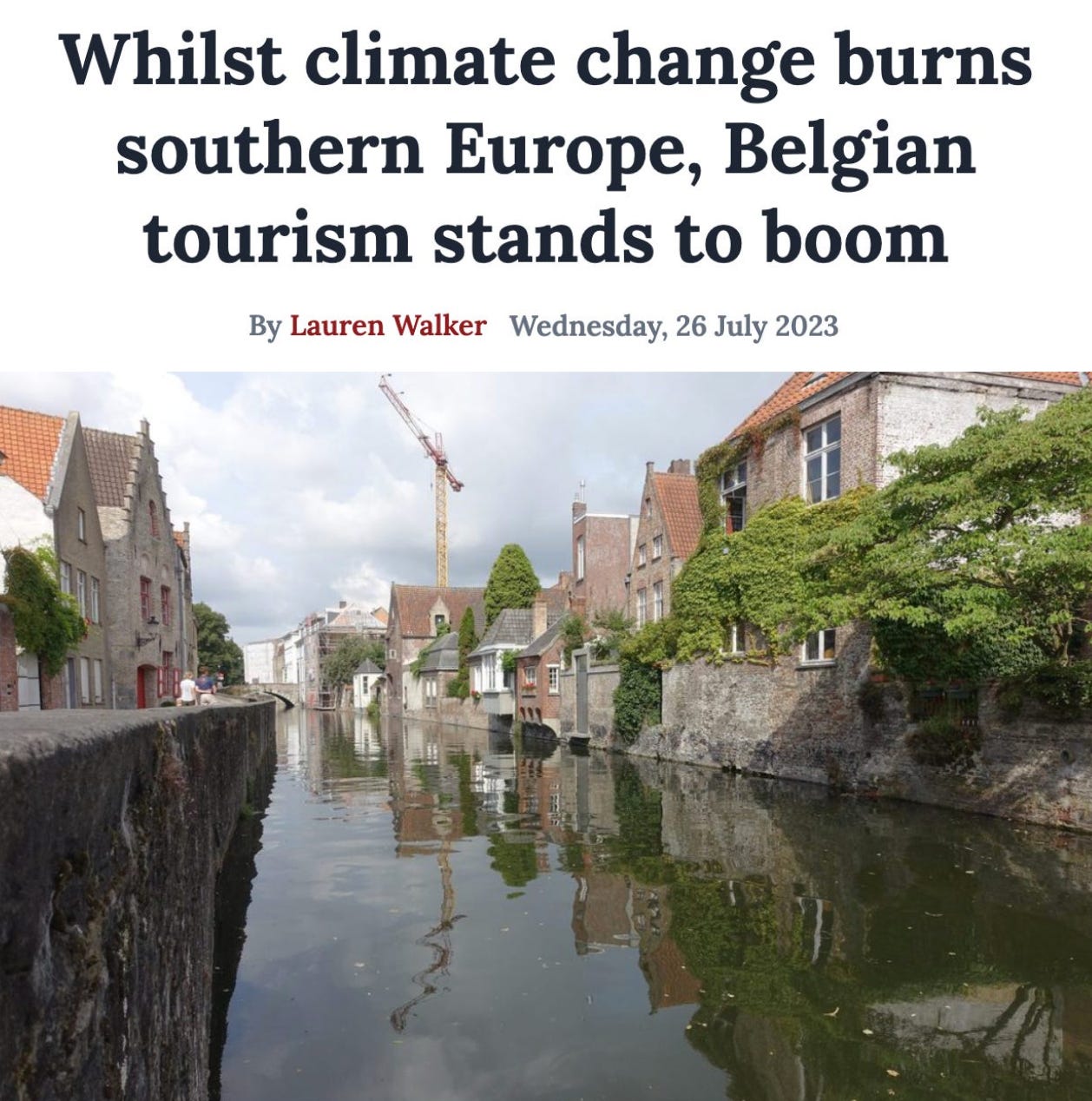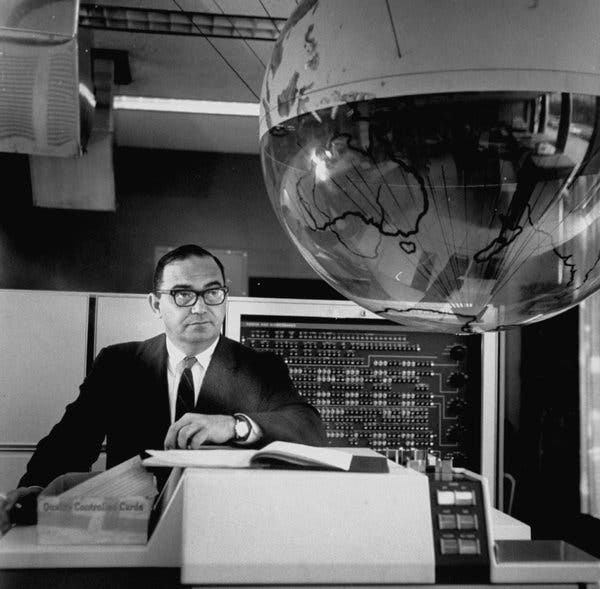Nordhaus, "Refuseniks" "Frontierniks" and "Limitniks"
The 'single number' theory that helped nix climate change
“Refuseniks”
Since my last post, US Republican presidential candidates have staged their first primary debate. Non-responses to a question on whether climate change was human-induced, invited ridicule and mirth worldwide. But the coy denials of these Republican “Refuseniks” are no more laughable than the denials of powerful economists - routinely described as ‘distinguished’ - and their influential echo chambers in the world’s media.
Speaking of which, I must address a blunder in my previous post on the FT’s Lex column. Noting the column’s concern with the impact of climate change on the economy, I wrote:
The Lex collective does express concern about the future of tourism - singling out Greece as an example - but tongue-in-cheek suggests all may not be lost because destinations such as Belgium would become more popular.
The Brussels Times picked up the reference and a week later reinforced the error, with this ‘good news’ story:

They are both wrong, and thus are fundamental economic errors made back in the early 1990s replicated and spread around the world.
My error in quoting Lex was use of the phrase ‘tongue-in-cheek’. I had wrongly thought the reference to Belgium was a gentle poke at that country’s lowly place on the tourist hot spot league table.
But I was quite wrong. Lex is deadly serious. Its authors had simply repeated the same flawed argument - based on a single number - made first by Nordhaus et al, and later repeated by Stuart Kirk. Namely, that a single number - today’s surface average increases in temperature for a place, Greece - can be used to predict the impact of future global climate conditions for Belgium.
As atmospheric engineering expert Robert White comments on the Nordhaus thesis (discussed below) temperature increases are
an extremely poor surrogate for a description of the climatic conditions
brought on by the complex dynamics that make up the earth’s global atmosphere.
Second: underlying the ‘single number’ theory is the wrong economic assumption. Namely that changes in today’s temperatures and GDP across regions and countries can be used to predict the future economic impact of global warming. Prof. Keen in Loading the Dice Against Pensions argues that:
… the empirical studies done using this assumption ignored the fact that incomes across regions today are not independent: cold regions can achieve high incomes today because they can trade with temperate and hot regions.
However, a hotter future global economy cannot trade with today’s colder global economy. [Emphasis added]
“Frontierniks” vs “Limitniks”
William D. Nordhaus is Sterling Professor of Economics at Yale University, best known for his work in economic modelling and climate change, and a co-recipient of the 2018 Nobel Memorial Prize in Economic Sciences for his work on climate change. [One of his early works is the introductory textbook, Economics, co-authored with Paul Samuelson.]
William D. Nordhaus’s body of work is where economists’ denial, delay and fudge all began.
In a paper published by American Scientist in 1994, and titled Expert Opinion on Climate Change - Nordhaus sets out the results of a survey he had conducted. The participants in the survey were carefully chosen. They included like-minded orthodox economists and a smaller group of social and natural scientists. It was a blatant effort to bolster his approach to climate change.
The Expert Opinion survey included ten economists - many of whom he must have known personally - four social scientists and five natural scientists.
Because this influential paper is behind a paywall, I’d like to quote it at some length.
Nordhaus has the integrity to point to a “methodological issue”with this survey - and in the process makes a confession:
I am known to the respondents as one who has developed estimates of the impact of climatic change that are modest compared with some of the scientific concerns and popular rhetoric, and this knowledge might have influenced the respondents.
Nordhaus begins his Expert Opinion paper with a breezily confident, even swaggering introduction that distinguishes between “Frontierniks” and “Limitniks”.
Concerns about the prospect of global warming offer a signal example of the tension between two different views of the relation between economic growth and resources.
At one extreme lies a cheerful frontier mentality that looks forward to limitless economic expansion for the human race. The earth, in this view, has endless rangeland to graze, oceans of offshore oil and gas for drilling, deserts on which to build airports and parking lots, and substitutes readily available wherever scarcities arise.
The frontier view sees human societies adapting readily to the modest projected rise in global temperatures that might accompany greenhouse warming.
“Limitniks” see clouds behind every silver lining, believe that global warming poses dire risks to natural ecosystems and hold that these risks will spill over to threaten human civilisation.
[They share] a dour conviction that finds constraints on every front for people and especially for the natural systems on which they depend. Economic development will inevitably be limited by the depletion of resources, overpopulation and lethal pollution. In this view, unintended consequences threaten to overwhelm human ingenuity, and we must be ever vigilant lest the dikes that hold back catastrophe break and we find ourselves inundated by the threatening seas.
Nordhaus lists members of his survey from 1-19.
Of the ten economists Nordhaus surveyed one is Lawrence Summers, ex-President of Harvard University, director of the National Economic Council from 2009-10, and the 71st United States Secretary of the Treasury from 1999 to 2001. It was he, who as the World Bank’s Chief Economist from ’91 to ’93,
signed off on an internal memo arguing that exporting pollution to countries with lower wages would reduce “foregone earnings from increased morbidity and mortality,” so that “the economic logic behind dumping a load of toxic waste in the lowest wage country is impeccable and we should face up to that.”
Larry Summers appears as No.17 on the list.
Under the sub-heading Apocalypse or Small Potatoes, Nordhaus asks respondents for their “best guess” at the impact of 3-degree warming by 2090. The reaction
..in the words of respondent 17, would be “small potatoes.”
Respondent 4 was Richard N. Cooper, Professor of economics, Harvard University. Former Under-secretary of State for Economic Affairs and former provost, Yale University. Member of the Synthesis and Mitigation Panels of the NAS Committee on the Policy Implications of Greenhouse Warming (1990-1992).
Prof. Cooper responds to Nordhaus thus:
there would be little impact through ecosystems: “For my answer, the existence value [of species] is irrelevant - I don’t care about ants except for drugs.”
Cooper is quoted by Nordhaus again, this time on “the incredible adaptability of human economies”:
I have not heard a compelling scenario about the crisis scenario. People tend to have an apocalyptic streak - for example, many scientists held that the probability of nuclear war was a few percent per year in the 1950s and 60s whereas a more realistic number would have been an order of magnitude smaller. On the basis of that tendency and the ability to adapt, even if climate change were very rapid, it wouldn’t be all that terrible….
Richard Schmalensee is respondent number 14. Professor of economics, MIT. Former member of the President’s Council of Economic Advisers. Supervised U.S. government report on the economics of climatic change and coordinated the government’s economic policies on climatic change.
In the Nordhaus paper Schmalensee -
explains that in his view energy and brain power are the only limits to growth in the long run, and with sufficient quantities of these it is possible to adapt or develop new technologies so as to prevent any significant economic costs. This respondent also points out that the time frame over which the climatic changes are expected to take place is sufficient to allow developments of new technologies and other adaptations. [Emphasis added]
The hero of the paper
The most remarkable of Nordhaus’s respondents was Robert White (atmospheric science and engineering, credited for revolutionizing weather forecasts). President, National Academy of Engineering. Former chief, US Weather Bureau, and administrator of the National Oceanic and Atmospheric Administration. He has oversight and review of reports on global environmental issues.
Nordhaus notes that
most respondents proferred ...estimates with reservations and a recognition of the inherent difficulty of the task.
But Robert White “was a holdout from such guesswork” - and writes:
I must tell you that I marvel that economists are willing to make quantitative estimates of economic consequences of climate change where the only measures available are estimates of global surface average increases in temperature. As [one] who has spent his career worrying about the vagaries of the dynamics of the atmosphere, I marvel that they can translate a single global number, an extremely poor surrogate for a description of the climatic conditions, into quantitative estimates of impacts of global economic conditions.
He, and we, may marvel. But we may also gasp with horror.
Millions of people will die horribly from fire, drought or floods; thousands of species will be made extinct - and much of the planet’s life support system will be destroyed by the breakdown of the earth’s climate. Many of those dire consequences could have been prevented or mitigated, if we had not been persuaded by economists nearly thirty years ago to ignore the warnings of rigorous natural scientists.
Instead, like today’s Republican presidential candidates, we preferred the voodoo economics of so-called ‘Nobel’ prize-winners.






As someone who learned from Prof Steve Keen just how existentially dangerous the willful misinformation perpetuated by Nordhaus et al can be, I imagine that many reading this topic for the first time are thinking 'it can't be that bad, can it?'
I have bad news - it's actually worse. The widespread acceptance of the shoddy 'thinking' of Nordhaus and his cohorts beggars rational belief.
Maybe it's not global warming to grapple with, and the bullet to bite is to create system change. Deal with an underlying belief system that has us in an exploitive dynamic instead of an altruistic one. Change our story and we change our world. So much moving the deck chairs otherwise. That's what I'm writing about, with ideas about things we can do.